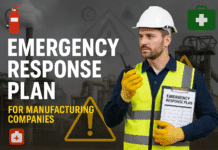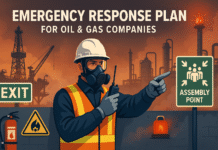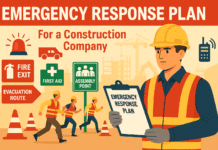
5 Career Opportunities in Safety Engineering
5 Career Opportunities in Safety Engineering : Safety engineering is an increasingly vital field in today’s world, as the focus on safety and risk management continues to grow. With an ever-increasing demand for professionals who can ensure safety in various industries, there is a wide array of career opportunities for those interested in this field. In this article, we will explore five promising career opportunities in safety engineering and provide insights into the skills and qualifications required for each role.
Safety Engineer
Safety engineers play a pivotal role in assessing and mitigating potential hazards in various settings. They ensure that workplaces and systems comply with safety standards and regulations.
Overview of the Role
Safety engineers are responsible for identifying safety issues, conducting risk assessments, and designing and implementing safety protocols. They collaborate with other professionals to develop safety programs and procedures that prevent accidents and injuries.
Educational Requirements
To become a safety engineer, you typically need at least a bachelor’s degree in engineering, with a focus on safety engineering. Some employers may prefer candidates with a master’s degree in safety engineering or a related field.
Skills and Responsibilities
Safety engineers must possess strong analytical skills, attention to detail, and excellent problem-solving abilities. They work with a diverse range of professionals and need effective communication and teamwork skills.
Health and Safety Consultant
Health and safety consultants provide expert advice to organizations to ensure compliance with safety regulations and best practices. They assess risks and recommend improvements.
What Does a Health and Safety Consultant Do?
Health and safety consultants conduct audits, inspections, and risk assessments to identify potential hazards. They then provide recommendations to mitigate risks and improve overall safety in the workplace.
Educational Background
A bachelor’s degree in occupational health and safety, environmental science, or a related field is typically required. Many health and safety consultants also obtain professional certifications.
Essential Skills and Duties
Health and safety consultants should have strong analytical skills, an eye for detail, and excellent communication abilities. They need to stay updated on industry regulations and best practices.
Environmental Health and Safety (EHS) Manager
EHS managers are responsible for creating and overseeing safety programs to protect employees and the environment.
Role and Responsibilities
EHS managers develop, implement, and manage safety and environmental programs. They ensure that their organization complies with safety and environmental regulations and reduce risks associated with operations.
Educational Prerequisites
A bachelor’s degree in environmental science, occupational health, or a related field is typically required. Many EHS managers also pursue advanced degrees or professional certifications.
Key Skills and Functions
EHS managers need strong leadership, problem-solving, and communication skills. They should have a deep understanding of environmental regulations and safety standards.
Industrial Hygienist
Industrial hygienists are responsible for identifying and mitigating workplace health hazards. They work to prevent illnesses and injuries caused by workplace conditions.
Understanding the Profession
Industrial hygienists assess workplace environments, conduct tests, and recommend measures to control and eliminate health hazards. They work in various industries, including manufacturing, healthcare, and construction.
Educational Qualifications
A bachelor’s degree in industrial hygiene or a related field is typically required. Many industrial hygienists also pursue certification through organizations like the American Board of Industrial Hygiene.
Roles and Responsibilities
Industrial hygienists need strong problem-solving and data analysis skills. They must be detail-oriented and possess excellent communication skills to convey findings and recommendations effectively.
Risk Management Specialist
Risk management specialists focus on identifying and minimizing risks within an organization. They work to protect the organization’s assets and reputation.
Exploring the Role of a Risk Management Specialist
Risk management specialists identify potential risks and develop strategies to mitigate them. They work closely with insurance providers, legal teams, and senior management to ensure the organization is well-prepared for various risks.
Academic Qualifications
A bachelor’s degree in risk management, business administration, or a related field is often required. Professional certifications, such as Certified Risk Manager (CRM), can enhance career prospects.
Key Responsibilities
Risk management specialists need strong analytical skills, critical thinking, and the ability to make informed decisions. They must stay updated on industry trends and emerging risks.
Conclusion
Safety engineering offers a diverse range of career opportunities, each requiring specific skills and educational backgrounds. Whether you are passionate about preventing workplace accidents, ensuring compliance, or managing risks, there is a path for you in this dynamic field.
Dubai Municipality conducts health and safety inspections at 566 men’s salons
Accident Prevention Plan (APP)
Web Sling Capacity Calculation
FAQs
- What is the role of a safety engineer?
- Safety engineers identify and mitigate safety hazards in various settings and ensure compliance with safety standards.
- What qualifications are needed to become a health and safety consultant?
- A bachelor’s degree in occupational health and safety or a related field is typically required, along with professional certifications.
- What is the primary responsibility of an EHS manager?
- EHS managers develop, implement, and manage safety and environmental programs, ensuring compliance with regulations.
- What does an industrial hygienist do?
- Industrial hygienists identify and control workplace health hazards to prevent illnesses and injuries.
- How does a risk management specialist contribute to an organization’s success?
- Risk management specialists identify and minimize risks to protect an organization’s assets and reputation, making it more resilient in a dynamic environment.

























Well articulated and impressive roles and responsibilities for a safety officer.please keep me posted.
Continue sending educational materials to do with enterprise risk management.
I am from ethiopia I am safety officer I need job
Out of Ethiopian
I have bsc degree in civil engineering
In road and building constraction I have 3 years experiance as site engineer but now I am working at Salini impergilo webuild
If there opportunity pleas address me
[email protected]